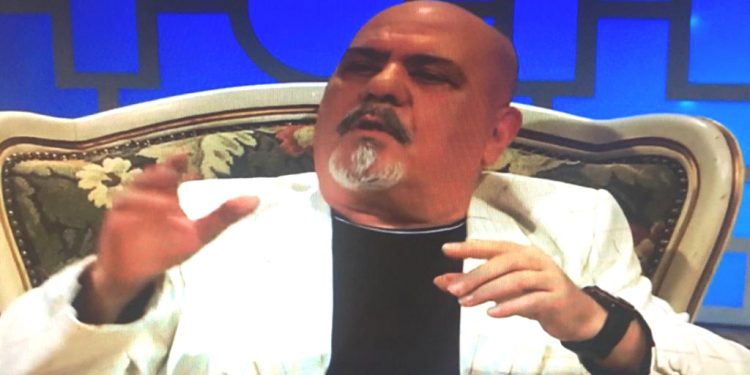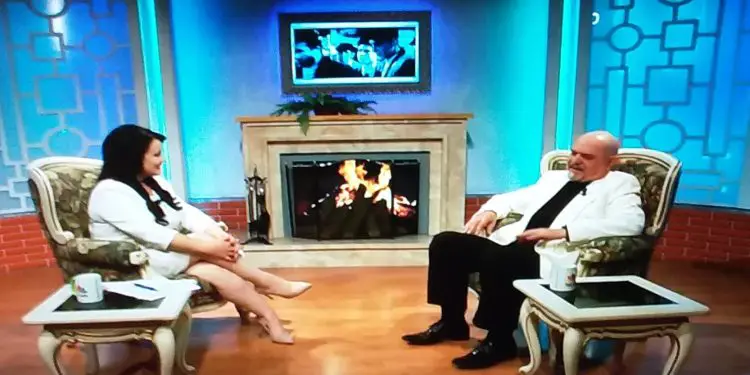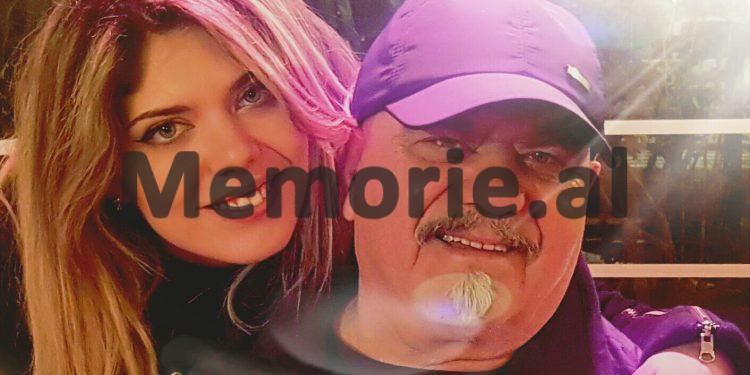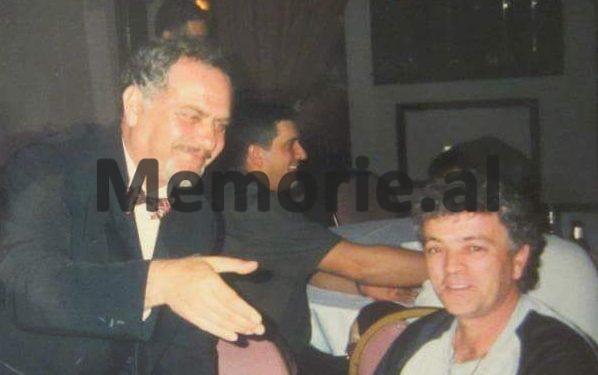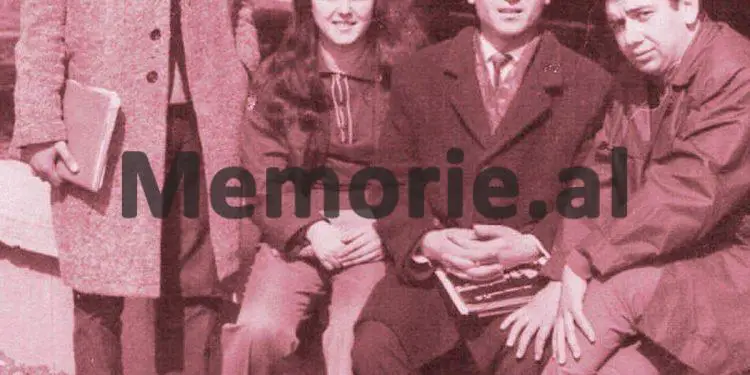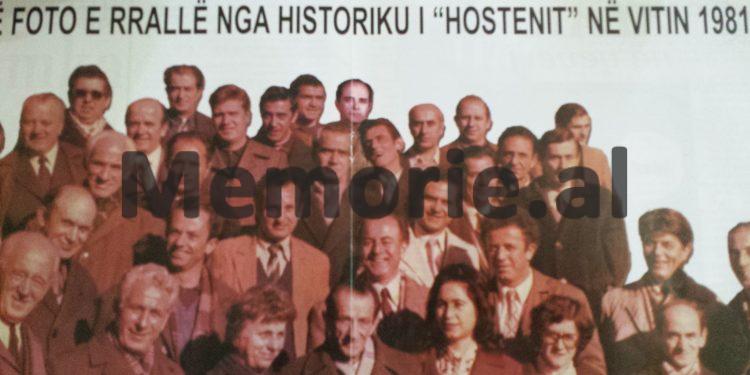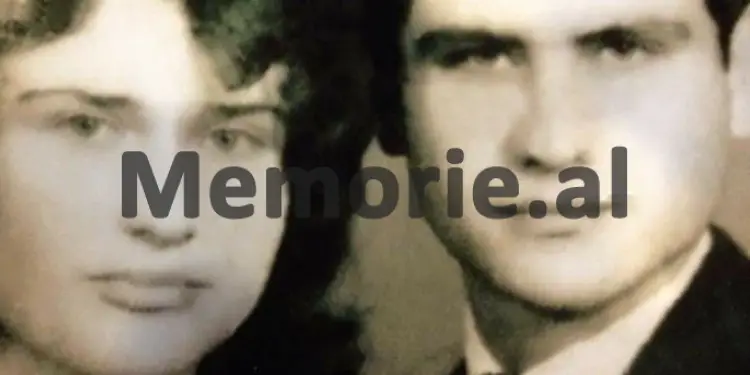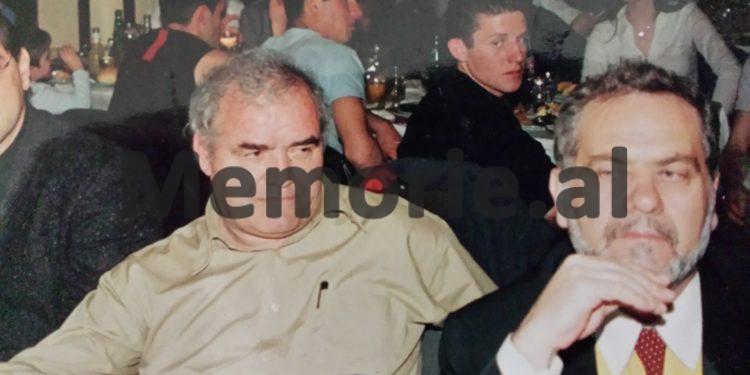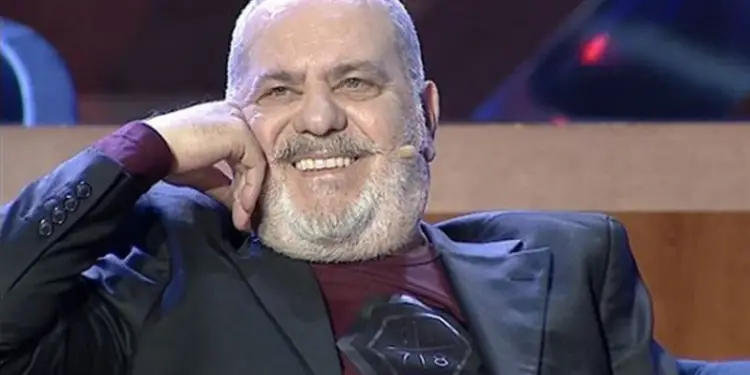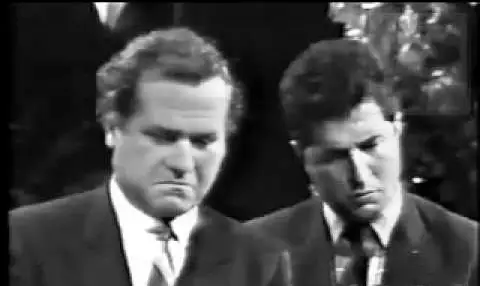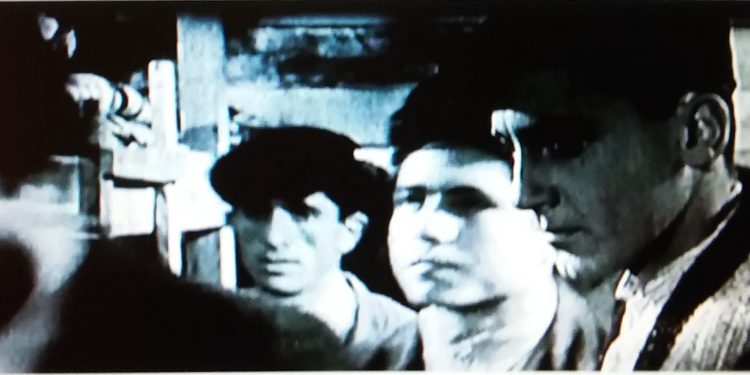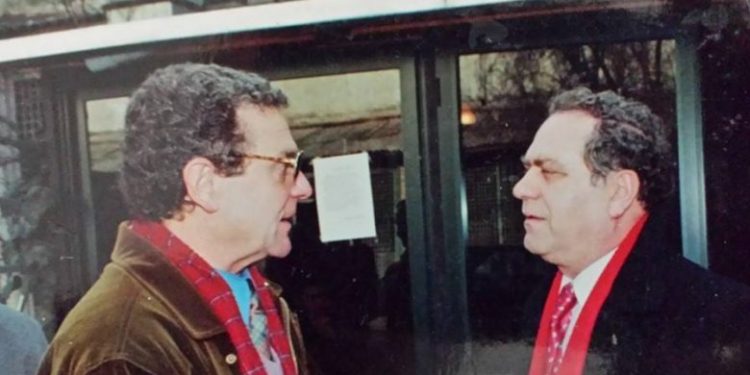Dashnor Kaloçi
The first part
Memorie.al/ publishes an interview given in the show “RRËFIM” on TV Scan some time ago, by the great Albanian painter, cartoonist, screenwriter, actor and director, Koço Devole, who passed away a few days ago, i who for 90 minutes, has told some of the unknown events and stories of his life, family and artistic career, starting from the origin of the family, the specialization of his father, Thanas, in Italy for cinematographer, work in that profession in the town of Kuçova, where Koço was born, coming to Tirana as a cinematographer at the “17 Nëntori” Cinema, leaving and being sent to Kombinat with a sentence as a worker, after it was discovered that he had arranged a direct telephone line for Tuk Jakovë and Bedri Spahiu, who were declared “enemies of the people”, Koço’s participation in the film rehearsals for a role in the film “Debate”, where he “did not win”, and an extra in “The First Years”, etc.
Koço’s passion and tendencies for painting, where he studied with the Russian engineer at the “Stalin” Textile Factory in Tirana, as well as with the theater district at the Pioneers’ Palace, where the Russian director entrusted him with several roles, the first cartoon he published in ‘Hosteni’ in 1964, roles in some dramas in the Culture Club in Kombinat, competition for the Art High School and biographical obstacles for ‘runaway uncle’, the right to study in Mechanical Engineering in Tirana where he stayed only two years, ‘for the sake of’ of the Indonesian friend who made the portrait and was ‘rewarded’ with coffee, lunches and dinners at the ‘Volga’, going to the Soldier and engaging in the Soldier’s Variety with his childhood friend, Roland Trebicka, after the intervention of the director, Viktor Gjoka, giving performances until at the farthest border points, etc.
The release of Koço from the Army and the work in the Culture Club in Kombinat, where he made a big name, after painting Enver Hoxha on a giant facade, the engagement in the magazine ‘Hosteni’ as a cartoonist and with scenarios for sketches and parodies, the appointment in the State Variety and then in the Albanian Radio-Television, work and projects after the ’90s with films, comedies, spectacles, etc., cooperation and work with his close friend, Filip Çakuli, until his prophecy said in this the show, where he, among other things, said: “… They do not ask at all if a great artist passed away, it is unfortunate! They refuse to escort them to the last apartment from the Theater, e.g. There have been many cases. The last case was Hajrie Rondo who with a hundred prayers, helped her a little. When they die yes, ironically, to do the greatest honor. I know that when I die, they will honor me, and they will say the usual things they said to others … “
“Before the ’90s, artists were praised, that the Party, did propaganda and called us’ its helpers’. That’s why he paid us. But this has nothing to do with the dictatorial system. We were respected by the party secretaries and everyone else. But that does not mean that system has been good. Absolutely, it has been dictatorial.
This is what the painter, cartoonist, screenwriter, actor and great director of Albanian humor once said in a long interview for the show “RRËFIM” on TV Scan (authored by Dashnor Kaloçi and moderated by Albana Shehu Qirjako). , Koço Devole, who passed away on November 8 and unfortunately, his prophecy “was fulfilled point by point”, as if the great Devole, “had left him in trust”, after he was escorted to his last apartment from a private funeral home ?!
In homage to one of the greatest icons of Albanian humor, Memorie.al, has uncovered and brings exclusively to readers, the rare testimonies of the ‘Grand Master’, Koço Devole, in several issues.
Mr. Devole, this picture of you we see on the screen is too early…?
Yes, this photo belongs to 1963- ‘64 and is a film rehearsal I did for the film “The First Years”, which was realized with a screenplay by the writer, Fatmir Gjata, according to your novel, “Swamp”. At that time, it was a big dream to act in a movie, and of course it was a great pleasure to be in front of the cameras, there at the Kinostudio “Shqipëria e Re”. It was a kind of dream that had just started to harass me, but I will come and tell you how this dream started, as it was the first movie “Debate”, where I did the rehearsal, I shot a lot, but in the end I did not go, as another boy won. It does not matter, I will say it too, but this moment we see in this photo, is after that of “Debatik”.
Were you touched and hurt that you did not win in that movie, that is, in “Debatik”?
Of course, apart from being a big dream to interpret in a film, it was also another pleasure, because there played and interpreted big names of the Albanian scene and cinematography, such as: Sander Prosi, Prokop Mima, Margarita Xhepa, etc., who we had seen them in the movies and now we had them close by, we had them by our side. It was almost magical, that when you have a big dream to appear on screen, in cinematography on television! It was shot pretty much, that it was a massive scene, (according to the script) where the dam exploded, at one point that assistant director came, and told us to be careful, as we initially had to be calm and only when the news came that the dam was exploding, we had to be alerted. But I was very embarrassed, because in all that crowd of 30-40 extras, I was one of them and I remembered that the assistant director and everyone, just looked at me and sat with a lot of embarrassment and fear, thinking that I would I did that scene for better or worse! So in that embarrassment I was, when the moment comes when the news was given by the assistant director, so the dam exploded, I do not know what I did, but when I saw the movie, (laughs) it was not that scene at all, I just looked a little I had come down from those beds that the decor had been built there, and that was all. So, ten seconds were or were not…?!
But you Koço were maximally engaged, even though you only appeared for a few seconds in that scene of the movie…?!
Definitely the commitment was maximum, but this thing came more from the great worry I had from the failure, ie, with the movie rehearsals I had done with “Debatik” and this is what I mean, that attempt to starring in that film in 1961 or ’62, I may be wrong over the years, but it’s close and it was a big initiative, when I remember it now. At the “8-Nëntori” School, where I was at that time, the director, Hysen Hakani, came, entered the classroom and saw everyone approaching me, as I had not been like that, I had hair, and he caressed me from my head said, “Do you want to act in a movie?” Meanwhile, out of joy, I stayed and did not speak at all and he addressed me again: “Hey, you like to come, don’t you…”?! “Yes,” I said immediately for fear of changing my mind. He told me: “Tomorrow you will come to Kinostudio”. I flew, I do not know, but I flew with joy in those moments, because it was a feeling that I do not know how to tell you …! The next day, “Gaz” of Kinostudios came to the school to pick me up and the whole school came out to greet me with their hands when I was entering there and they said: “Come on, honor us, goodbye Koço, etc dhe” and me made by hand. Hypa, I went to Kinostudio, I took some pictures with the great actor, Besim Levonja (who is no longer alive, respectfully) and the great Sander Prosi, and I do not know who it was that years have passed and I do not remember them, but I remember these two very well and we did some shooting, not with some pigeons, not with an Italian I gave the turtle, etc.
Tartaruga …?!
Ehh, poo tartarughe, something like that, there were some scenes that the director Hyseni had chosen, scenes that seemed very difficult to him and would I cope with that shooting. So these were scenes that were repeated with filming, a few days, “Gaz” would come to school and pick me up, my schoolmates would greet me, send me to the Kinostudio, keep rehearsing the filming, bring me back to school, pick me up again and so a couple of weeks this work. Suddenly, after a week, the Director of Kinostudio, Todi Bozo, comes and tells the director, with his characteristic voice (that Todi, as far as I know, is alive and I wish him another 100 years, he is Petrit at at’s father), and says to Hysen: “Oreee, what is ki mo, ki is bigger than them, find another mo…”. I remained so frozen. “Find another mo, this one is bigger than these, as Roland Trebicka, as Dhimitër Pecani, you understand…, Coli must be small mo Hysen…”! And so Hyseni came and caressed me, the shooting was cut in the middle and he said to me, ‘hey, we will talk, I will come again dhe’ and the next day I waited, but “Gaz” did not come anymore and in a way the dream was broken . It was really broken, but when I was called a second time, the desire to perform was rekindled. But time had passed and of course I had participated in these theater groups with schools, with the Pioneer Palace, etc., and also, I as a child was engaged in drawings, paintings, sculptures with mud and other trifles like all children in that age.
Did you have a penchant for art …?
Yes, I had, I remember that in Kombinat, he was a textile engineer, but he made oil paintings and I would come out from behind and communicate with him, because he knew a little Albanian and he would say to me: “Try to make drawings like this, that you have a style … “. Even though I did not understand what he was saying, I tried to draw and I had it with a lot of passion and desire, since I was little, so before I went to the cinema rehearsals at Kinostudio, my dream was to become a painter. But the path of life twisted and the one who became the reason is a director, Mihallaq Baliu, who has been to the Central House of Popular Creativity, and he saw something in me, as I had written for the first time a type of parody, about 10 lines. It must have been 1959-’60, I was young and it was a children’s parody, where I dealt with those children’s pranks, when we did not go to school, or played with slingshots, etc. And he encouraged me to write, encouraging me, but in addition, I continued to deal with cartoons and in 1964, I managed to publish my first cartoon, in Hosteni magazine. It was a caricature like 30 or 40 other caricatures I had made, and when I looked at the people who bought Hosten magazine, I remembered that they bought it for me, even though no one thought of my caricature. However, it was a big event for me, the publication of that cartoon, that I will never forget. It was a small caricature, but it became the main impetus I took for years and years at Hosteni Magazine.
As far as we know, from a young age when you were in the Pioneer Palace, in the 7-year school, you did not deal with drawings and cartoons, but with literature …?!
Yes, I dealt with literature, with drama, we only dealt with drama, but I had my mind on painting and I always said that I would become a painter, even though I had a passion for literature. So, it was a dilemma, so to speak, that I do not know how to define, between painting and literature, this was the beginning of my passions, which later came and consolidated, becoming my profession in life. I remember that in 1961 or ’62, there was a Russian director, who gave me a role of John Mark John, in Loni Papa’s drama “Three Rifle Shots”. I was very young, but they made me make-up, mustaches, gray hair, put on blankets, etc.
Where did she find you and what did she see in you?
There she found me in the theater group and I do not know what special thing about me that engaged me in that drama, she should be asked, but it is not desolate. That was where that tendency was strengthened, we are talking about theater, and I was engaged in other parts, then came the comedy “Residents of degree no. 6”, by Dionis Bubani. These were my first beginnings with art, stage and drama in particular, because that of the Palace of the Pioneers, was like a joke. So, I started then…! I mean, I got stuck at the Theater, not that I had any great desire. So, the caricature and the great desire for the stage, got mixed up and I leaned away from the comedy.
You have had the chance and the opportunity to meet the icons of the Albanian cultural and artistic life, since you were selected for the film rehearsal of “Debatiku”, ie the best actors of that time?
Yes, of course, only no one put a stamp on us when they told him, and we just sat and watched. I remember when Prokop Mima, gave us the artistic word and we looked at him like that, as he did his job with a lot of passion. And there came a moment when Prokopi, with his characteristic speech, (he was an excellent actor and the whole constellation of other actors of that time), with that timbre of his special voice, said to us: “We must give the sound to every letter, every word, the spectator at the end of the hall must also understand … “. And we sat like that and listened intently. For example, when he said: “The cartoonist, caricatured a characteristic cartoon ‘, and we had to say the whole sentence, dividing the words into syllables ….” As some of us said, even laughing and we were left in mind those words, we repeated them to each other, but he was a great unique actor.
Did you have a favorite actor at the time to think like I became like this …?
The actor we dreamed of was Mario Ashiku, whom we had as an idol, since we first saw him in the movie “Furtuna” in the role of Arben, he was a great actor and also a charming man and I told him Marios later, for us to see all the adoration and sympathy.
You have spent a good part of your life in Kombinat, you did high school there, you worked there, but as we learned, when you were little you went to the Cinema “17 Nëntori”, how do you remember that time Cinema “17 Nëntori” “?
Yes, in Kombinat, I was there. Ehhh Cinema “17 Nëntori”, that my father was the Cinematographer of the Cinema “17 Nëntori” and the actors of the Theater also came there, that it was the only cinema at that time, together with the Cinema “Donika” of Partizani ”, were the only ones, because there were three cinemas at that time. Of course, the well-known actors came at that time, where, as my father used to say, they took me for a year, two years, because my father, in addition to being a cinematographer there, was the first cinematographer in the Kuçova Cinema, that I was born there in Kuçova. My father was the first cinematographer there and he had also gone to Italy to learn about that profession, but he had also learned about these ice cream machines and they called him all over me, for these jobs. I will talk a little about my father, as I remembered his words when I was a child and he showed, as every child remembers some things, that become the cause of a bad event in the family. We were taken to Kombinat with a sentence, because when my father came to Tirana, from where he was also dealing with telephones (after he got his hands on many things), he made a direct telephone connection to Tuk Jakova and Bedri Spahiu, when these were members of the Politburo and held senior positions after Enver Hoxha. But after these were condemned and came out as “enemies of the people,” like many others, they asked; but who did this to you? ‘Thanas Devole’, they said …! Remove it, the order was given immediately and my father was removed from the “17 Nëntori” Cinema, and we were taken to Kombinat. These things that happened to my father have remained in my mind, because I could not conceive of that thing …?!
What about the parents, the mother and the father, did they discuss that thing in the family, that is, the punishment of the father?
No, they never discussed it, but this has been the reality and I do not want to dwell too long on this event that brought a lot of vicissitudes to our family, as this brought life with sadness and other problems, and like us, there have been dozens families that have suffered. So, I do not want to dwell on this event, because the viewer who follows us, surely, expects me to tell you something to laugh …!
But to stay a little here at the event with your father who ended up convicted in Kombinat?
It ended there, but because she was good and they needed her, they were forced to do it again and became the head of the department, but now in another profession. He was so good that even the Soviet specialists and engineers who were there in Kombinat asked him and consulted with him about various work problems. Because as I told you, he had been a couple of years in Italy, in 1939 or in ’40, something like that and he had learned a lot there from these professions.
What about you personally, what memories do you have of the Combine, since you spent not a few years there, e.g. from high school what do you remember?
From Kombinati I have a lot of memories and from high school as well, but since 1964, when I graduated, so many years have passed and …, but of course I remember my classmates and many of them, such as. some who later became doctors, such as Drita Llaha (Hana) or Bedrie Bezhani, etc. And out of all the class we were then, only I deviated and came out like this, z’droms, as they say …?!
So, you deviated?!
I was deviating because everyone turned out to be doctors or engineers, while I …, in fact, I also started for Engineering at the beginning …?!
So, we will stop there, when you were in high school and finished high school, did you dream of what you would become, so what did you want to study for?
My dream was to become a painter and I had wanted to continue the Art High School, but I did not accept that my biography hindered me and I found out about this too late. An uncle of my father had fled to America in 1939. And so that regime, they said that the uncle did not run away in ’39, but ran away in ’49. Now, this ’49 was called a political fugitive and with that, they told me, ‘be careful now’. I understood this late as I told them, because when I went to compete in the Theater, the High Institute of Arts was then, I say I did well, but they did not give me the right, because apparently, it was the work of this uncle that they did to me fugitives in ’49. That there was no other reason, because every time I competed, in Lice and then, they said to me, ‘well, very well’, but I never won. Only in Mechanical Engineering it came out to me, because I had excellent Technical Drawing and I do not know how it came out to me, and how it came out to me, but I had Technical Drawing 10 with grades that doubled at that time, as the highest grade until then it was five. I enjoyed Technical Drawing and Mechanical Engineering came out, where I stayed for two years, as they did not erase my name like the other times. I did not like that branch and I stayed there for those two years, just for the sake of an Indonesian friend of mine (there were many foreigners in the faculties at that time) who came every day to pick me up and give me some coffee. The whole thing was, how he almost adored me, because I made a painting of his portrait and a cartoon, and he enjoyed these, and he did not share with me, but neither did I, how did I share …! (Laughing).
So, you had the right not to be separated, because you deserved the coffee with those paintings you made?
Not only coffee, what coffee, because then we went to lunch, we did not stay for coffee, so we progressed … (laughs) we went to serious places, like “Volga”, but one day I told him, that I will not continue the faculty. He told me, ‘no, don’t leave him, you will make a mistake, not like that, not like that’, but I had decided and he cried a lot when we broke up. Two years passed and he left, I do not know where, because I could no longer connect with him.
Where did you go after leaving Engineering?
After I left Mechanical Engineering, I was taken as a soldier for the defense of the homeland and assigned to Tirana, in the Soldier’s Variety, where I was with Roland Trebicka, my childhood friend.
But who took you to the Soldier’s Variety, how did you arrange it?
But who took us, we had a little talent, they said, so Viktor Gjoka took us there with Thanas Gjoka and they took us to the Republic Guard? We told him, ‘what are we going to do there’, we will do theater, said Rolandi. We were wearing uniforms with weapons, with shaved heads, exactly like a soldier. There we then started dealing with theater, because the director Viktor Gjoka met us and told us that tomorrow you will come to the Central House of the Army, where we started rehearsals immediately with the Soldier’s Variety. It must have been something like November 1966 or ’67, because over the years, I told you I was not very accurate. From there we then went to Vërzhezhë of Skrapar, where he was the “brave man without eyes” that said comrade Enver Hoxha and we went there, we gave performances at the top of the snowy mountain!
Yes, did the Soldier Estrada have these?
Yes, there were, I understand, but where did it happen for us to go there for the first time, when we went as soldiers, here I had the word, that we were soldiers and we would go where the homeland needed.
Have you been on good feet …?
Yes, with good legs, there at the top of the mountain where a great military exercise took place and, in the end, they gave it to him, Fuat Çela, one ….
A decoration …?
No no what decorations, they gave him a machine gun, so “Kallash”, they gave it to him there and he was desolate, he cried with joy, because he did not expect it, he gave it to the Chief of General Staff, Petrit Dume and he did not look, but when they left it in his hand, he emptied it with all joy and said: “This weapon that the Party gave me, I will keep it like the eyes of the forehead”, and at that moment, that boss fell with his elbow, (because he could not see and the eyes they said he had damaged a grenade, but anyway) and those words, he said a couple of times and just as elbows ate the desolate from that officer who was next to him! But then, apparently, he understood and the fourth time he said: “I will keep this machine gun that the Party gave me in my heart like the eyes of my forehead”, and so…!
Did you laugh…?
It was to be laughed at, but to whom did he keep laughing, these were dumb things and one did not joke easily with what the Party said, how “he was brave without eyes” and with “Kallash”, etc. /Memorie.al
Continues tomorrow




